
The Second International Forum on Agricultural Product Markets and Trade Successfully Held at Renmin University of China
On December 8, 2023, the Second International Forum on Agricultural Product Markets and Trade was successfully held at Renmin University of China. The forum was guided by the International Cooperation Department of the Ministry of Agriculture and Rural Affairs, co-hosted by Renmin University of China and the Bank of China, and organized by the School of Agricultural Economics and Rural Development at Renmin University of China. Over 220 representatives from various sectors, including diplomats from several countries in China, relevant government agencies, financial institutions, agribusiness multinationals, local agricultural and rural departments, research institutes, industry associations, and high-quality agricultural international trade development bases, attended the forum.
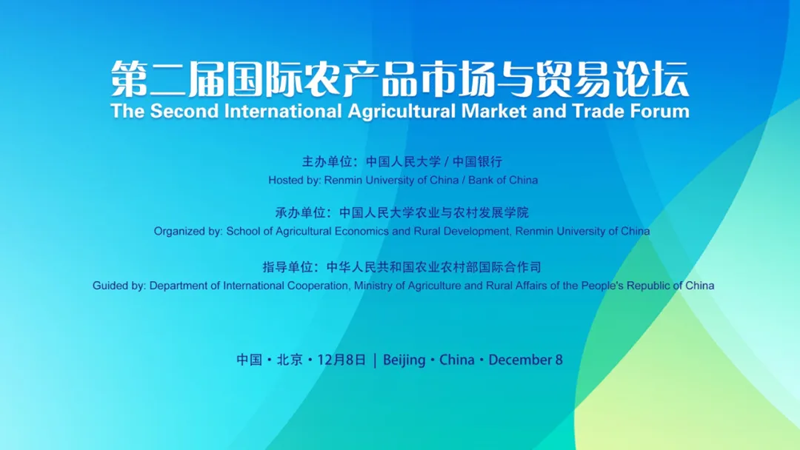
The forum was inaugurated with speeches by Zhu Xinkai, Vice President of Renmin University of China; Peng Tingjun, Deputy Director of the International Cooperation Department of the Ministry of Agriculture and Rural Affairs; and Zhang Xiaodong, Vice President of the Bank of China. The forum comprised three segments: guest speeches, keynote addresses, and panel discussions.
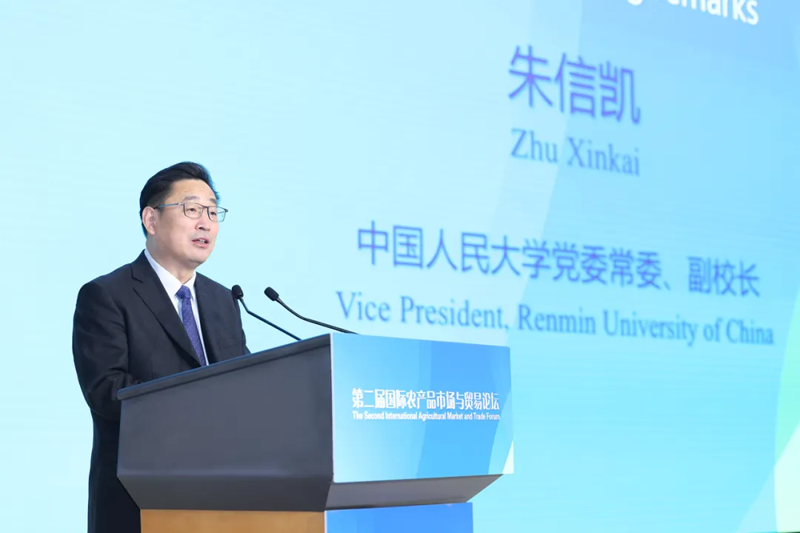
In his speech, Zhu Xinkai remarked that since the first forum held in March this year, international agricultural product market prices have fluctuated dramatically, making the market situation increasingly complex. New trends and changes have emerged in global agricultural trade patterns. The second forum aimed to review and summarize the basic characteristics of the international agricultural product market in 2023 and to forecast the trade situation for 2024, providing a timely platform to discuss these topics. Renmin University of China is committed to working with peers to contribute to the healthy development of the global food industry and the maintenance of global food security.
Peng Tingjun emphasized the necessity of re-evaluating the international agricultural product market and trade against the backdrop of continuous market turbulence and localized food crises. He explained the basic concept of regenerative agriculture, which involves regenerating soil productivity, biodiversity, and resource recycling to enhance yield, efficiency, and benefits while improving soil health, efficiently utilizing water resources, mitigating climate change, and restoring biodiversity. He proposed that countries should rebuild a secure, stable, efficient, open, inclusive, and mutually beneficial agricultural industrial chain and supply chain.
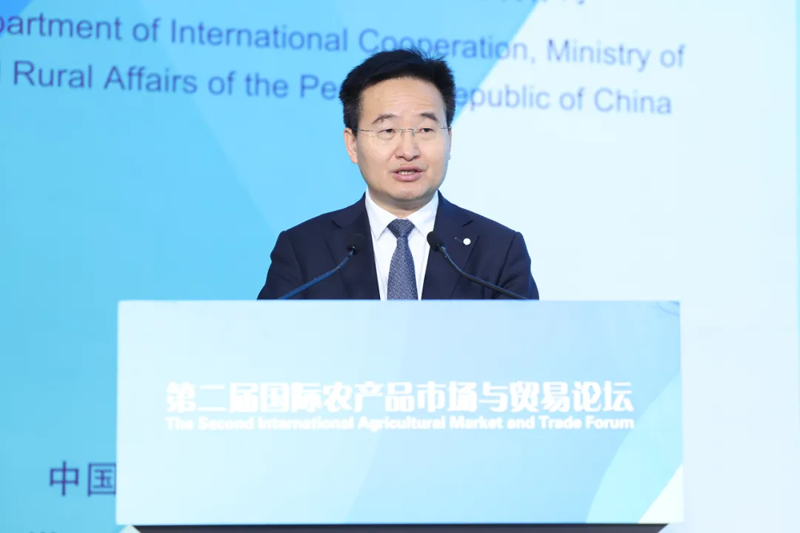
Zhang Xiaodong highlighted that the Bank of China has actively built platforms for international agricultural product trade connectivity and investment promotion, increased financial support for agricultural enterprises, and continuously contributed to accelerating the construction of a strong agricultural nation. He emphasized the Bank of China's commitment to high-quality financial services to support both "going global" and "bringing in," thus contributing to the stability of the global agricultural industrial chain and supply chain and promoting high-quality development in international agricultural product markets and trade.
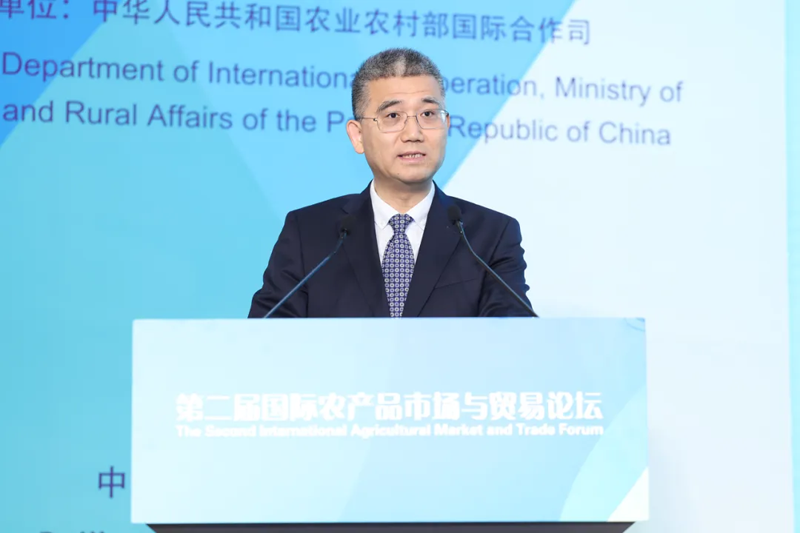
Peng Tingjun also released the "International Agricultural Product Market and Trade Situation Report (December 2023)." The report predicts that in 2024, global agricultural product supply and trade will face pressure due to factors such as slow global economic recovery, ongoing El Niño phenomenon, intensified geopolitical conflicts, and the prevalence of trade protectionism and unilateralism. Frequent extreme weather, recurring pests and diseases, and sustained geopolitical conflicts could lead to reduced grain production in major producing countries, threatening global food security. The supply-demand balance for cotton, oil, and sugar will be slightly tight, while the balance for meat and dairy will be slightly loose. International agricultural product prices are expected to remain volatile, and China's agricultural product trade is expected to develop steadily.
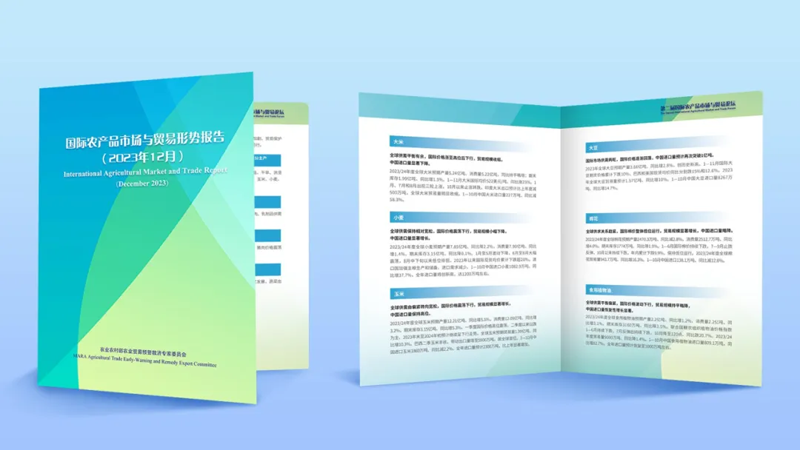
The keynote address session was chaired by Qiu Huanguang, Dean of the School of Agricultural Economics and Rural Development at Renmin University of China. Professor Cheng Guoqiang of Renmin University of China introduced the production, supply, and trade patterns of China's agricultural products against the backdrop of upgrading food consumption structures, the key factors affecting China's agricultural product trade, and future development trends. Janusz Wojciechowski, EU Commissioner for Agriculture, shared the latest EU Agricultural Mid-Term Outlook Report, discussing the impacts of climate disasters on agricultural production, the new Common Agricultural Policy of the EU, and trends in consumer concerns about the environment and health. Seth Meyer, Chief Economist at the United States Department of Agriculture, emphasized the crucial roles of China and the United States in regional and global food security, advocating for increased cooperation and market transparency to address global challenges. Silvio Isopo Porto, Director of Agricultural Policy and Information at the National Supply Company of Brazil's Ministry of Agriculture, discussed Brazil's agricultural production and market trade prospects, considering factors such as agricultural supply-demand trends, exchange rates, energy prices, agricultural logistics, and weather threats in major production areas.
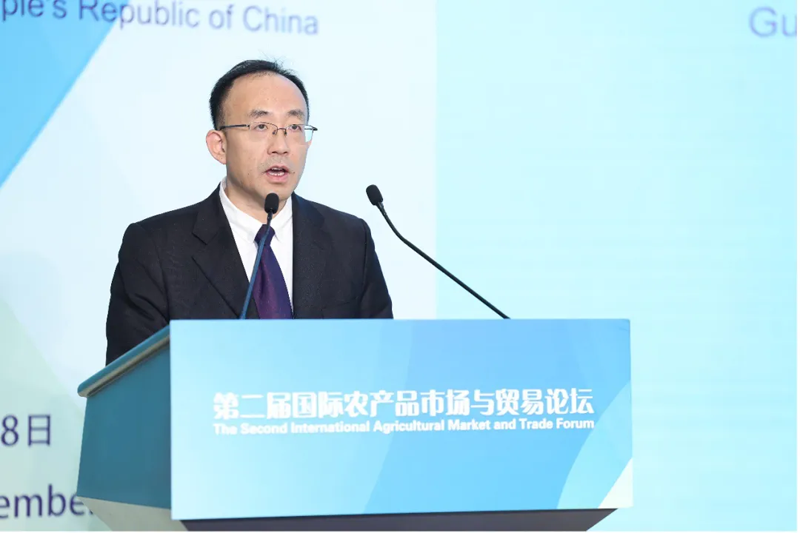
In the panel discussions on grain, cotton, oil, sugar, and livestock products, Wang Xiaohui, Director of the National Grain and Oil Information Center; Wang Jianhong, Deputy Director-General of the Agricultural Materials and Cotton Bureau of the All China Federation of Supply and Marketing Cooperatives and First-Class Inspector; and chief experts on various commodities from the Agricultural Trade Early Warning and Relief Expert Committee of the Ministry of Agriculture and Rural Affairs, COFCO Capital, COFCO Futures, the Dalian Commodity Exchange Research Center, the China Chamber of Commerce for Import and Export of Foodstuffs, Native Produce and Animal By-Products, the US Embassy in China, the German Embassy in China, and Brazil's JBS Company, exchanged and analyzed the trade and supply-demand trends of major products such as grains, oilseeds, sugar, cotton, pork, beef, mutton, dairy products, poultry, and eggs. They discussed these trends from perspectives such as historical and current supply-demand patterns, interactions within the industrial chain, the penetration of financial and energy macro factors, and changes in production, storage, and sales policies.
Professor Tang Jianjun of Renmin University of China delivered the forum's concluding remarks. He noted that this forum featured more keynote speeches than the first one and that the content of the released report on the international agricultural product market and trade situation was more detailed and enriched, reflecting the significant role of the Agricultural Trade Early Warning and Relief Expert Committee of the Ministry of Agriculture and Rural Affairs in guiding international agricultural product market expectations.

